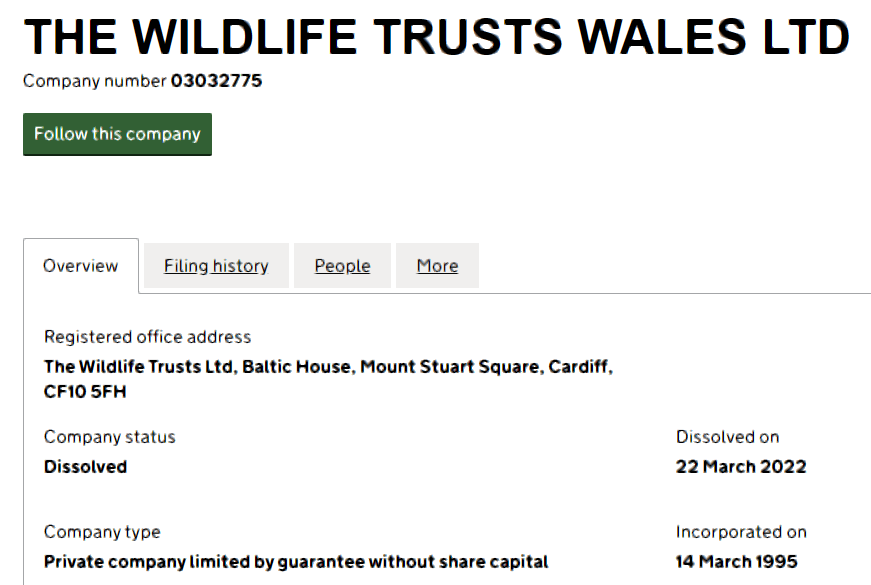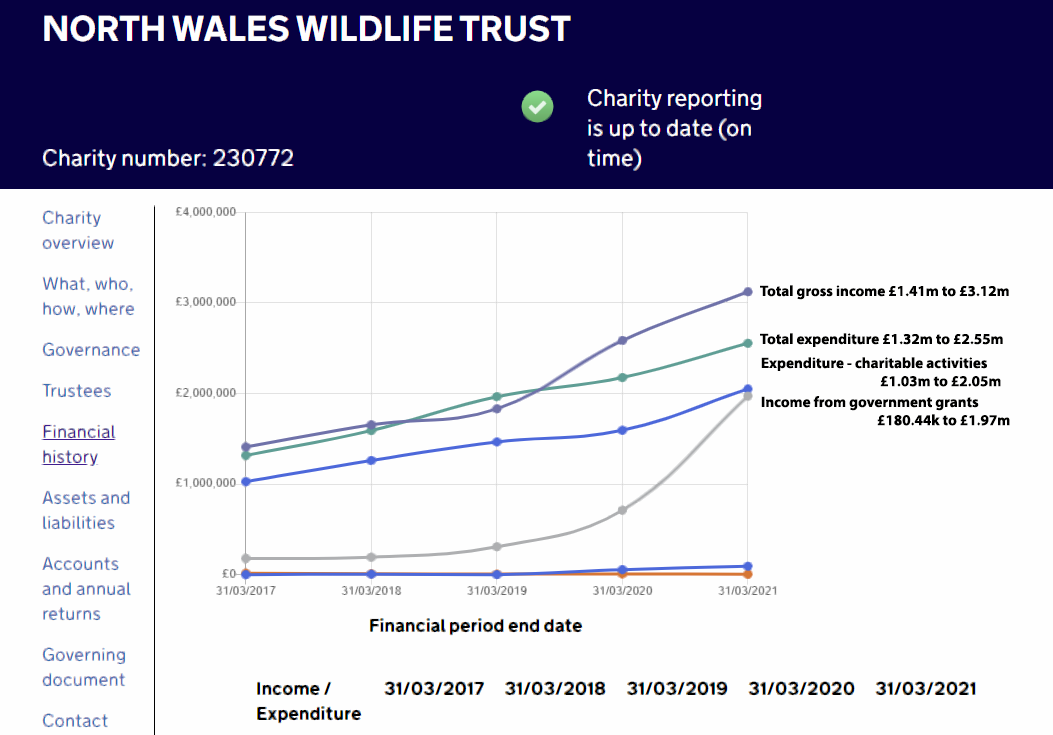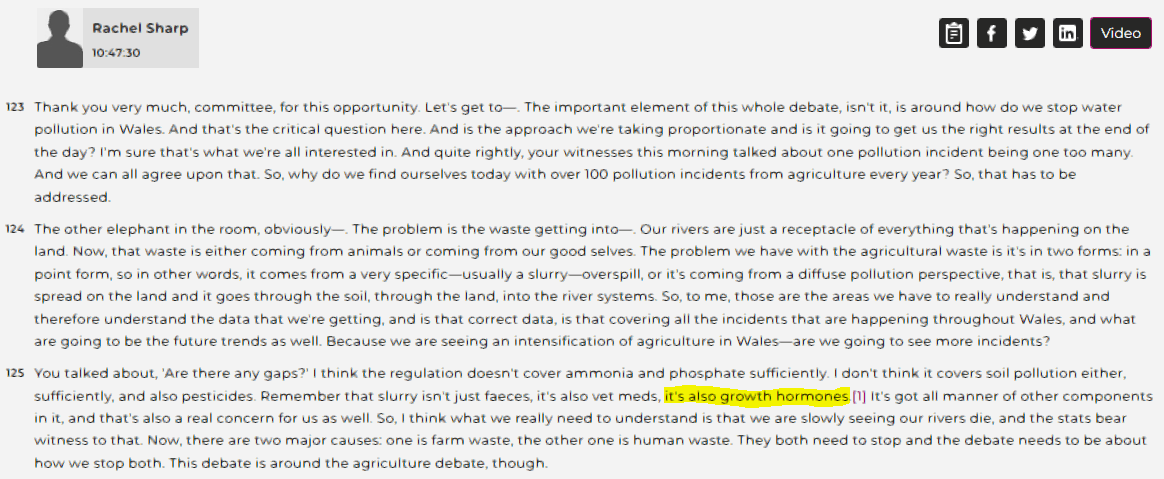![]() This week’s piece about wildlife trusts and environmental groups complements what I put out last week about the assorted river charities.
This week’s piece about wildlife trusts and environmental groups complements what I put out last week about the assorted river charities.
For both seem to be funded to shield Dŵr Cymru (Welsh Water) and others from criticism by blaming livestock farmers for all river pollution. Also, to pursue the so-called ‘Welsh Government’s Net Zero lunacy and, in so doing, serve the globalist agenda.
With a few twists.
Wildlife and environmental groups tend to contain more ‘zealots’, which results in hysteria, and a readiness to tell lies. Which in this context is often accompanied by a thinly-disguised contempt for Wales and Welsh identity.
One example might be the charity Wildlife Trusts Wales (WTW) choosing to dissolve itself, while the local trusts for which it served as the umbrella organisation joined England’s Royal Society of Wildlife Trusts. You’ll learn more about this as you read on.
As I say, there will be similarities with last week’s piece, but also differences. And I promise a bit more in the way of polemic. Ol’ Jac gonna let rip!
It’s fairly big, so go make a mug of something before settling down to enjoy it.
♦
WHO’S WHO IN THE FLEECE JACKETS
Let’s start by looking at the organisational setup.
As I said in the intro, Wildlife Trusts Wales recently put itself out of business so that the five regional trusts – North, Montgomeryshire, Radnorshire, South and West, Gwent – could become full members of the Royal Society of Wildlife Trusts (RSWT).
Explained at the foot of page 1 in the 2021 WTW accounts.

The clip below from the Charity Commission entry tells us that the RSWT now views Wales and England as a single unit, whereas Scotland and Northern Ireland are treated separately. Even the Isle of Man gets more respect than us.

But then, when you surrender your separate identity this is what you can expect.
And yet, the pretence of an independent existence is maintained by a Wildlife Trusts Wales website. Where WTW describes itself as: ‘one of five Wildlife Trusts in Wales’ which, again, makes no sense. Yes, there are five, I just listed them, and they’re all area specific, so where and how does WTW fit in?
It’s all very confusing. Perhaps deliberately so.
At the foot of the WTW website home page we are given Companies House and Charity Commission numbers. The latter draws a blank because the charity was closed March 31, 2021. While the Companies House entry tells us that the company voluntarily dissolved earlier this year.

So why hasn’t the information on the website been updated? If it’s claimed WTW still exists, then what form does that existence take?
And what happened to the money?
Well, the final accounts for the WTW (y/e 31.03.2021) seem to show, at the foot of page 19, that the cash left when the company folded was divvied up among four of the five trusts I mentioned earlier.
Brecknock received nowt because it had not long before merged with the South and West Wales Wildlife Trust, which for some reason was itself left out. (Why didn’t ‘Brecknock’ make the obvious merger, with Radnorshire? Or why not a Powys trust?)

You’ll see that £234,320 went to the ‘All Wales Conservation Strategy’. Does anyone know what that is? I’ve tried Googling but nothing comes up. Do the funders know where their money’s going?
The more I thought about this wildlife trusts reconfiguration the stranger it appeared. I mean, just think about it.
Before devolution we had local wildlife trusts with Wildlife Trusts Wales serving as the umbrella body. Yet now, when wildlife trusts deal with Y Senedd, when there’s separate Welsh funding, different legislation, they do away with their national body in order to, effectively, become English wildlife trusts.
This move makes no sense on any rational or practical level. How then can it be explained? I really would like to know.
Whatever ethereal form Wildlife Trusts Wales now takes the wraith clearly retains the strength to use a Twitter account. Here’s a gem put out on Monday.

To describe Wales as ‘one of the most nature depleted countries in the world’ is hysterical nonsense and an insult to us as a nation.
While suggesting that farming is to blame rather gives the game away.
The image used in the tweet comes from this source, linked with Denmark farm, near Lampeter, where we find another gang of alien envirogrifters. A farming source tells me the allegation made in the image may be libellous.
The Denmark Farm Conservation Centre has gone the way of so many outfits that appear on this blog – it was Dissolved earlier this year. With two outstanding charges.
◊
FILTHY LUCRE
We saw in last week’s piece that river charities saw a remarkable increase in official funding at the very time Minister for Rural Affairs Lesley Griffiths (and Gary) was formulating her draconian and ‘unworkable’ NVZ legislation.
Such propinquity!
Well, no. It’s explained by the fact that Lesley (and Gary) wanted a stream of pollution stories in order to justify that NVZ legislation.
Stories that were also music to the ears of Dŵr Cymru (Welsh Water) bosses, because it deflected attention from the water company’s pollution.
We see something very similar in wildlife trusts.
Let’s start with the North Wales Wildlife Trust. Where total income more than doubled between 2017 and 2021. The largest element of that increase is (in various forms) government funding, up from £180,440 in 2017 to £1,970,000 in 2021.
Plus assets of around £3m.

A ten-fold increase in government funding will support a few beavers.
The picture at the Montgomeryshire Wildlife Trust shows a more modest but still healthy increase in funding. To which we must also add assets pushing £3m.
Moving south we come to the intriguing anomaly of the Radnorshire Wildlife Trust. Intriguing for in the old 13-county arrangement you will recall that Radnorshire was quite small in size and had the lowest population of all our counties.
But the local wildlife trust paints a different picture. Total income doubled between 2017 and 2021 and there are assets of over £2m. There were no assets in 2019.
The Wildlife Trust of South and West Wales has seen income increase by 50% in the period we’re looking at, but government grants increased from £21,300 in 2017 to £748,050 in 2021. Then throw in assets of some £5m.
Finally, to Gwent. Where income has increased at a more modest rate apart from a huge blip in 2018 accounted for by Heritage Lottery funding for a project on the Gwent Levels. But with assets around the three million pound mark.
So everything looks just tickety-boo on the financial front for our English-registered wildlife trusts.
◊
BARE-FACED LIES
I am indebted to one of the few honest journalists left in Wales for drawing my attention to a disgraceful incident last November, at a hearing of the Senedd’s Economy, Trade and Rural Affairs Committee.
Rachel Sharp of the zombie-like Wildlife Trusts Wales and Wales Environmental Link (WEL) alleged that along with all the other evils livestock farmers are responsible for they also use growth hormones, which eventually end up in our streams and rivers.
The transcript is here (123) and the video here.

The truth is that growth hormones have been banned in the UK since 1981. Welsh livestock farmers do not use growth hormones.
After protests from farming unions and Tory MS Sam Kurtz apologies were issued. But as we’ve come to expect from these envirofanatics it’s never an honest ‘I was wrong’. It’s always qualified, position shifting, hoping the original lie lingers.
But this time they’d gone too far, and it wasn’t just Rachel Sharp telling porkies. Also there representing Wales Environmental Link was Creighton Harvey, also a trustee of Afonydd Cymru Cyf.
Here’s how the Pembrokeshire Herald reported it.
‘The evidence of Ms Sharp’s fellow representative from Wales Environment Link was also riddled with errors.
Creighton Harvey told the Committee that agriculture was the largest polluter of Wales’s watercourses.
The largest polluters are water companies, industrial users, and domestic users’.
So who is Rachel Sharp?
Well, as we know, she’s a trustee of Wales Environmental Link. But this profile from the ‘Welsh Government’ website tells us a bit more. And it’s fascinating.

To begin with, it keeps up the pretence of the defunct Wildlife Trusts of Wales. But concludes by informing us that Rachel Sharp is also ‘a group member of the Welsh Water Independent Environment Advisory Panel’.
So what’s that? Here’s a clue from the Dŵr Cymru website.
We’re told, ‘The Chair is Mari Arthur, Director of Cynal (sic) Cymru’. But Mari Arthur left Cynnal Cymru in July 2018, after just 4 months. Is this another site in need of updating?
Mari Arthur now runs Mari Arthur Marketing, but hasn’t yet registered it as a company. Among her clients we find Cynnal Cymru. Also, joined-at-the-hip ‘Welsh Government’ and Cardiff University.
Her other companies include Afallen LLP and Tetrimteas Cyf.
If the name Mari Arthur rings a bell it’s because she so badly damaged Plaid Cymru in Llanelli, a seat the party had been nurturing since the days of the great Carwyn James.
She was forced on the constituency party by her friends in both Plaid Cymru and Labour. For in the Corruption Bay circles in which Mari Arthur moves party labels mean little as long as you’re ‘on the right side of history’.
The Independent Environmental Advisory Panel is clearly a group that allows Dŵr Cymru and envirozealots to agree their narratives in the war on livestock farmers and draw attention away from Dŵr Cymru itself, the biggest culprit.
There should be no place in Welsh public life for Rachel Sharp of the mythical Wales Wildlife Trusts, the all too corporeal Wales Environmental Link, and the Dŵr Cymru claque in the laughably named Independent Environmental Advisory Panel.
I suspect Rachel Sharp’s mask slipped last November when she forgot where she was; because when she and others of her ilk usually talk with politicians and civil servants – and of course, Dŵr Cymru – they tend to reinforce each other’s self-serving prejudices about livestock farmers.
But she’ll survive. For she has powerful friends, among those who’ve been elected, and those we’ve never heard of.
∼
Another name that caught my eye among the Wales Environmental Link luminaries was Natalie Buttriss, whose Linkedin profile (here in pdf) tells us she’s ‘Director of Wales The Woodland Trust’. This outfit previously used the name Coed Cadw for its Welsh operations, but this pandering to the indigenes seems to have been dropped.
Native of Bristol Buttriss was in at the start of the Summit to Sea land grab. For which she appeared on this blog four years ago in The Welsh Clearances. Her contempt for farmers was made obvious in this radio interview with the BBC’s Farming Today.
I have always believed that Buttriss was so arrogant, so dismissive of the interests of livestock farmers, because she believed she had the full support of the ‘Welsh Government’.
For in that interview she suggests that subsidies would be withheld or cut to make farmers fall into line. She wouldn’t have said that unless certain Bay politicians had promised to play the heavies.
The ‘Welsh Government’s hand was not revealed because the opposition to Summit to Sea made backers like Rewilding Britain pull out and the whole thing seemed to fall apart.
Or maybe it’s still out there, lurking in the undergrowth, waiting to re-emerge.
As we know, climate alarmists have too much influence with the media, partly through having brainwashed two generations of schoolchildren and college students, and partly through funding – ever wondered why Bill Gates gives money to the BBC?
Or perhaps, more pertinently, why the BBC is allowed to accept his funding?
But the propagandising is not confined to the BBC.
∼
Last Friday ITV’s Wales at Six ran a piece about cooperation between the Rhug Estate and the Welsh Dee Trust. A relatively harmless little filler.
But the newsreader, Andrea Byrne, dropped into the report: “Rivers like the Wye and the Usk are virtually dead and no longer able to support an abundance of fish like trout and salmon and other wildlife“.
Bizarre, and completely untrue. But from where did ITV Wales get that lie?
Because if it’s true then somebody should tell Harry Legge-Bourke of the Glanusk estate; for he advertises, ‘fantastic fishing on 5 miles of double bank fishing on the River Usk offering day tickets for Trout and Salmon rods’.
No one disputes that these rivers could be healthier, but they’re far from ‘virtually dead’, as ITV Wales would have us believe.
And if these rivers are in decline, then whose fault is that? Because if the finger of guilt is being pointed in the wrong direction to protect the guilty party then things are unlikely to improve.
There is constant financial backing and other support for those who tell lies about livestock farmers from those who benefit from and capitalise on those lies.
I’m often inclined to believe in coincidences. But not this time. What I’m describing is too widespread, across too many sectors.
If it quacks like a duck, and it waddles like a duck . . .
◊
CONCLUSION
The environmental / wildlife / Nature bodies in Wales are like exotic organisms in a Petri dish. Forever growing, dividing, re-forming, changing appearance and colour, and multiplying through the introduction of fresh viruses.
There are many reasons why there should be no further public funding for these groups. You’ve read some of those reasons here. But Sebastian and Claudia needn’t go without because there are plenty of funding streams they could tap into.
For example, and seeing as they’re promoting the agendas of the UN and WEF, one possibility must be the Bill & Melinda Gates Foundation.
Another option would be George Soros. Contact details can be had from Coleg Soros in Talgarth, where environmental and wildlife groups already have many contacts.
Bottom line, and last word . . .
It’s obscene that a country – especially our country – gives tens of millions of pounds every year for truth-averse zealots to enjoy sinecures fretting over toads and butterflies while our people die because ambulances don’t turn up.
♦ end ♦
